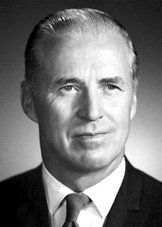Norman Borlaug fue uno de los padres de la revolución verde y premio Nobel en 1970.
Hoy en día la revolución verde recibe muchas críticas, con razón en algunos casos (quizá fue demasiado optimista en cuanto a la sostenibilidad ambiental de lo que defendía), pero sin razón en la mayoría: ha sacado del hambre a millones de personas en Asia y América.
Borlaug fue consciente de las posibilidades que ofrecía la mejora tecnológica en agricultura, pero tambien lo fue de sus peligros. Este es un extracto de lo que opinaba sobre la biotecnología:
A growing number of agricultural scientists, (…) anticipate great benefits from biotechnology in meeting our future food and fiber needs. Since most of this research is being done by the private sector, which patents its inventions, those of us concerned with agricultural policy must face up to a potentially serious conundrum. Most of those being born into this world are among the abject poor, most of whom live in rural areas of the developing world and depend on low-yielding agricultural production systems to eke out a meagre existence. How will these resource-poor farmers be able to afford the products of biotechnology research? What will be the position of these trans- national agribusinesses towards this enormous section of humanity that still lives largely outside the commercial market economy? This issue goes far beyond economics; it is also a matter for deep ethical consideration. Fundamentally, the issue is whether small-scale farmers of the developing world also have a right to share in the benefits of biotechnology. If the answer is yes, then what is the role of international and national governments to ensure that this right is met? I believe we must give this matter serious thought.
Se puede encontrar en su artículo FEEDING A WORLD OF 10 BILLION PEOPLE: THE MIRACLE AHEAD. Este artículo puede servir para profundizar en el debate sobre la productividad agrícola, las necesidades de alimentación de multitudes enormes y la viabilidad de las pequeñas explotaciones en relación con las grandes. El debate seguirá abierto por muchos años.


